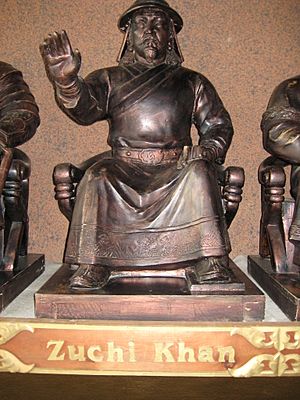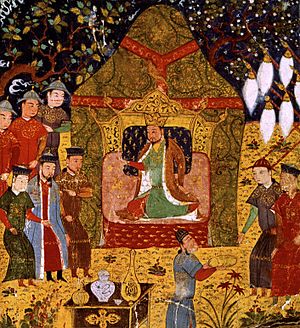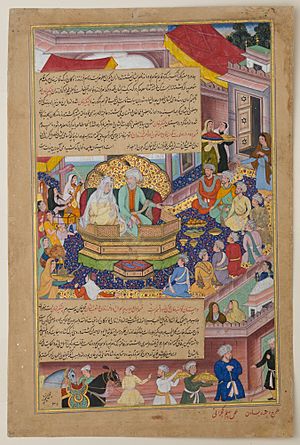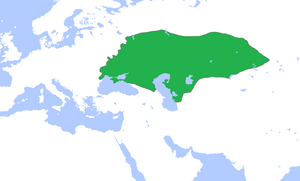Jochi facts for kids
Quick facts for kids Jochi |
|
|---|---|

Statue of Jochi Khan in Mongolia
|
|
| Khan of the Ulus of Jochi | |
| Predecessor | none |
| Successor | Orda (c. 1206–1280) Batu (c. 1207–1255) Berke, Khan of the Golden Horde from 1257–1267 |
| Born | 1182 Khamag Mongol |
| Died | 1227 (aged 44–45) Cumania, Mongol Empire |
| Burial | Zhezkazgan, Kazakhstan |
| Spouse | Sarkan Khatun Bekutemish Khatun Ukin Kuchin Khatun Sultan Khatun |
| House | Borjigin |
| Dynasty | Ulus of Jochi |
| Father | Genghis Khan |
| Mother | Börte |
| Religion | Tengrism |
Jochi (Mongolian: Зүчи, Züchi; Kazakh: Joşı, Жошы, جوشى; Chinese: 朮赤; pinyin: Zhú chì; Crimean Tatar: Cuçi, Джучи, جوچى; also spelled Djochi, Jöchi and Juchi; c. 1182– February 1227) was a Mongol army commander who was the eldest son of Genghis Khan, and presumably one of the four sons by his principal wife Börte, though issues concerning his paternity followed him throughout his life. An accomplished military leader, he participated in his father's conquest of Central Asia, along with his brothers and uncles.
Early life

There is some question as to Jochi's true paternity. Shortly after Börte's marriage to Genghis Khan (known as Temüjin at the time), she was abducted by members of the Mergid confederation. She was given to a certain Chilger Bökh, who was the brother of the Yehe Chiledu, as a spoil of war. She remained in Chilger Bökh's captivity for a few months before she was recovered by Temüjin. Shortly afterwards she gave birth to Jochi. By all accounts, Genghis Khan treated Jochi as his first son, but a doubt always remained whether Temüjin or Chilger Bökh was his real father. Jochi's descendants, although they formed the oldest branch of Genghis Khan's family, were never considered for the succession in claiming their father's heritage and there were signs of estrangement between Jochi and Genghis Khan.
Wars of conquest

In 1207, Jochi conquered several of the forest peoples in Siberia, extending the northern border of the Mongol Empire for the first time. On behalf of his father, Jochi led two campaigns against the Kyrgyz, in 1210 and in 1218. Jochi played a major role in the Khwarezm war of 1219–1221 in Central Asia – his forces captured the towns of Signak, Jand, and Yanikant in April, 1220, during this war. Subsequently, he was given the command of operation against the city of Urgench (Gurganj, in present-day Turkmenistan), the capital of the Khwarezmian Empire. Here the siege of the town suffered delays because Jochi engaged in extensive negotiation with the town to persuade it to surrender peacefully and to save it from destruction. Jochi's brother Chagatai regarded this action as militarily unsound: Chagatai wanted to destroy the city but Genghis Khan had promised the city to Jochi after his victory. This difference of opinion on military affairs deepened a rift between Jochi and Chagatai. Genghis Khan intervened in the campaign and appointed Ögedei as the commander of the operation. Ögedei resumed the operations vigorously – capturing, sacking and thoroughly destroying the town and massacring its inhabitants (1221).
The differences in tactics between Jochi and Chagatai in early 1221 added to their personal quarrel about the succession. To settle the matter, Genghis Khan called for a "kurultai", a political and military council - a formal meeting used both in familial matters and in matters of state. Temüjin had won election/appointment as Khan of his tribe during a kurultai, and he called them often during his early campaigns to garner public support for his wars – such meetings were key to Genghis Khan's legitimacy. Tribal tradition was also critical. As Genghis Khan's first-born son, Jochi was favored to rule the clan and the empire after his father died. At the familial kurultai called in 1222, Chagatai raised the issue of Jochi's legitimacy. At that meeting, Genghis Khan made it clear that Jochi was his legitimate first-born son. However, he worried that the quarrelsome nature of the two would split the empire. By early 1223 Genghis Khan had selected Ögedei, his third son, as his successor. For the sake of preserving the Empire, both Jochi and Chagatai agreed, but the rift between them never healed. Their rift would later politically divide the European part of the Mongol Empire from its Asian part permanently.
Legacy
Jochi's son Berke was among the earliest Mongols to convert to Islam. Among his other descendants were Öz Beg Khan, Tokhtamysh and Hacı I Giray.
Under Jochi's son Batu, Mongol rule expanded to its westernmost limit, and the Golden Horde (Kipchak Khanate) was established to consolidate the Jochid ulus. Öz Beg Khan would later oversee the economic, military and political golden age of the Horde and presided over its Islamisation,
The first mention about his mausoleum is found in 16th century Sharaf-name-yi shahi, describing the 1582 the campaign of the Abdullah Khan II:
On Saturday, 6th month, (khan) stopped near (Navaqi) Sarai in front of the mazar of Jochi khan.
Wives, concubines, and children
Like his father, Jochi had a large number of wives and concubines, however the exact details of these women are scarce.
Jochi had at least 14 sons and two daughters:
- Orda (c. 1206–1251)
- Batu (c. 1207–1255)
- Berke, Khan of the Golden Horde from 1257–1267
- Berkhechir
- Shiban
- Tangad
- Teval (Buval). He was the grandfather of Nogai Khan.
- Chilagun
- Sinqur
- Chimbay
- Muhammed
- Udur
- Tuq-timur, the ancestor of late khans of the Great Horde.
- Shingum
- Qoluyiqan. She married Törelchi, eldest son of Quduqa-beki of the Oirats.
- Daughter who married the Qarluq chief of Almaliq.
- Begtütmish, sister of Sorghaghtani and Ibaqa
In fiction
Jochi appeared as a supporting character in the 2007 Japanese-Mongolian film Genghis Khan: To the Ends of the Earth and Sea, played by Kenichi Matsuyama and in the 1978 Pakistani drama Aakhri Chattan played by Wakeel Farooqui.
See also
 In Spanish: Jochi para niños
In Spanish: Jochi para niños


